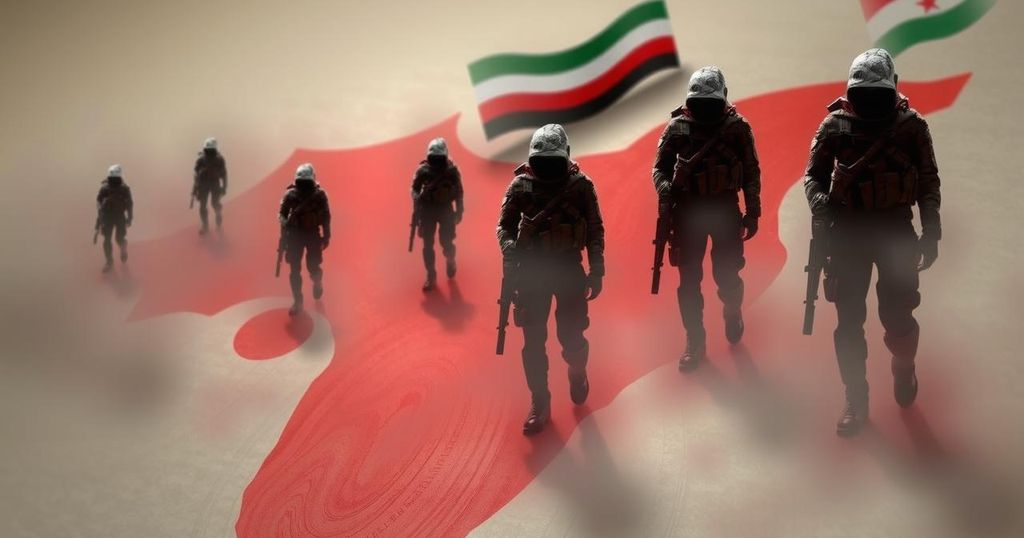Current Status of Iranian Proxies in Syria: Fatemiyoun and Zainebiyoun
The Iranian proxies, Fatemiyoun and Zainebiyoun, have faced substantial challenges amidst a resurgence of anti-Assad rebels in Syria, leading to mass desertions and uncertainty over their future. Initially formed to support the Assad regime against the Islamic State, their roles have become increasingly precarious as the dynamics of power shift within the region, sparking speculation about their potential disbandment by Iran.
Following the recent resurgence of anti-Assad rebels in Syria, the Iranian proxy groups, Fatemiyoun and Zainebiyoun, have faced significant challenges. Established as integral components of Iran’s “Axis of Resistance” to support the Assad regime, these militias significantly contributed to military operations against the Islamic State. However, as rebel forces advanced, many members deserted their posts amid escalating pressures. Researcher Phillip Smyth notes this rapid abandonment, revealing the inadequacy of manpower claims.
The origins of these two groups trace back to the early years of the civil war when they were recruited primarily from Afghanistan and Pakistan. The Fatemiyoun Brigade, comprising Afghan Shiites, and the Zainebiyoun Brigade, formed of Pakistani fighters, were both organized and supported extensively by Iran’s Islamic Revolutionary Guard Corps (IRGC). Although the Fatemiyoun was reported to include as many as 20,000 soldiers, estimates indicate their ranks, like those of the Zainebiyoun, have diminished significantly in recent times.
Throughout the Syrian conflict, the Fatemiyoun and Zainebiyoun operated across various regions, often used as auxiliary forces by Hezbollah in strategic operations. Despite the Assad regime’s consolidation of power, the recent shifts on the battlefield have compelled these groups to either abandon their positions or face potential disbandment by Iran. Experts suggest that Iran is unlikely to dissolve these groups as they remain vital to its regional strategy amid increasing attacks on other allied factions.
As of now, the fate of these proxies remains uncertain; some might have crossed into Iraq, fled to Iran, or assimilated into Lebanese Hezbollah. However, indications show they have largely vacated their established bases, leaving behind vacated structures captured in videos by anti-government forces. The departure of the Fatemiyoun and Zainebiyoun marks a critical juncture in the ongoing conflict and highlights the vulnerabilities within Iran’s military alliances in the region.
The discussion surrounding Iranian proxies, specifically the Fatemiyoun and Zainebiyoun brigades, is essential for comprehending the dynamics of the Syrian civil conflict. These militias were formed under the strategic directives of Iran to fortify the Assad regime against both internal and external threats, particularly from the Islamic State. The reliance on these groups highlights Iran’s efforts to extend its influence and create a localized resistance against radical Sunni factions. The evolving landscape of the Syrian war, including the ups and downs of these militia forces, provides valuable insights into the complexities of regional power plays and national sovereignty.
In summary, the current status of Iranian proxy groups in Syria reflects a significant shift brought about by the resurgence of anti-Assad military factions. The Fatemiyoun and Zainebiyoun, once formidable reinforcements for the Syrian regime, have faced substantial attrition, notably through mass desertions amid renewed conflicts. Although their future remains uncertain, especially considering Iran’s strategic interests in maintaining an active militia presence, the effectiveness and operational capabilities of these groups have been notably diminished by recent developments.
Original Source: www.voanews.com




Post Comment